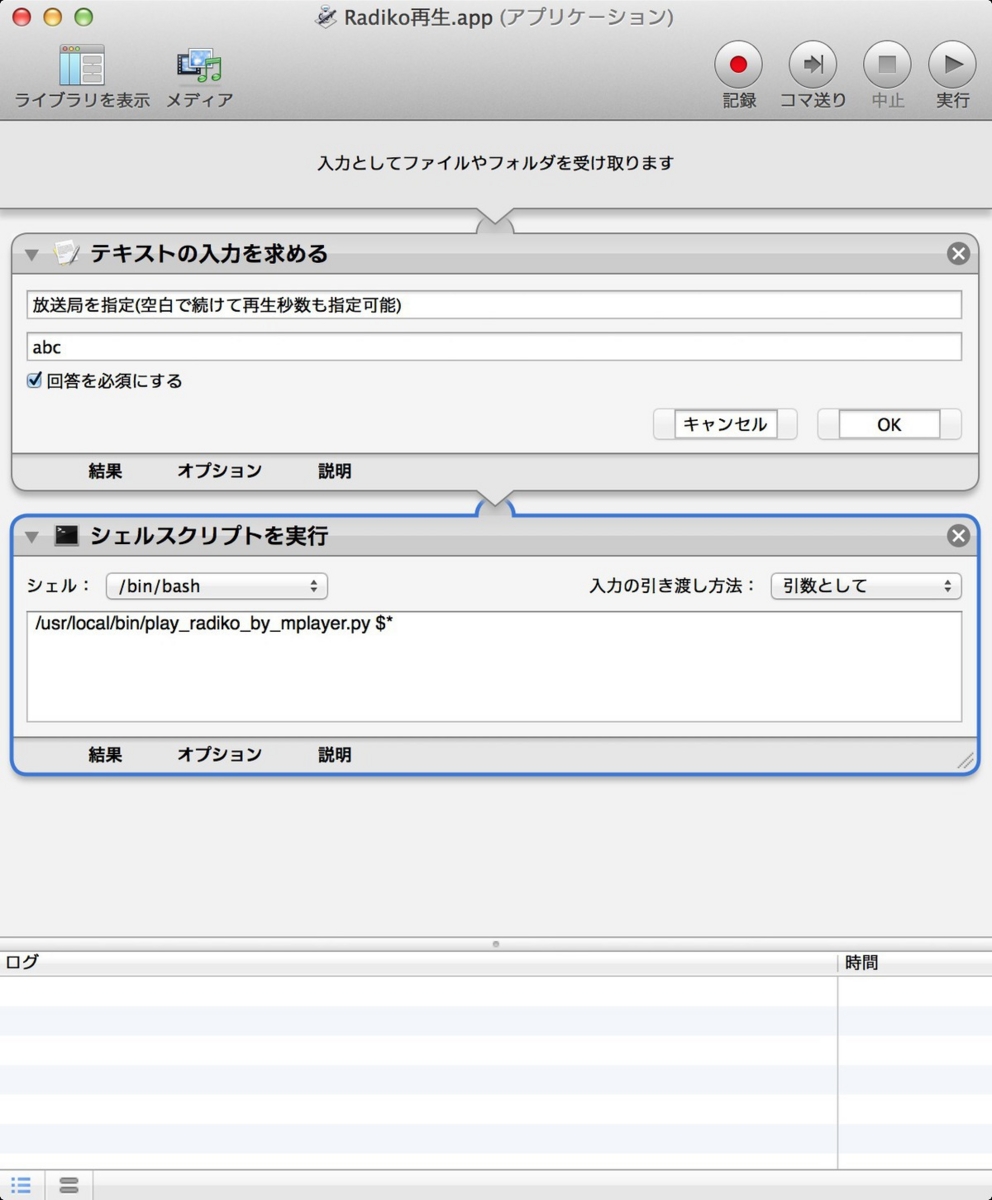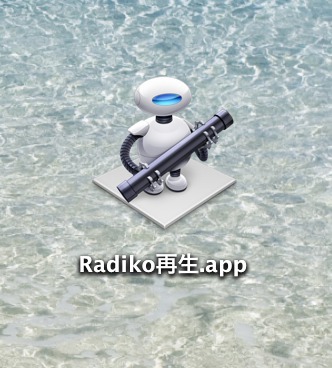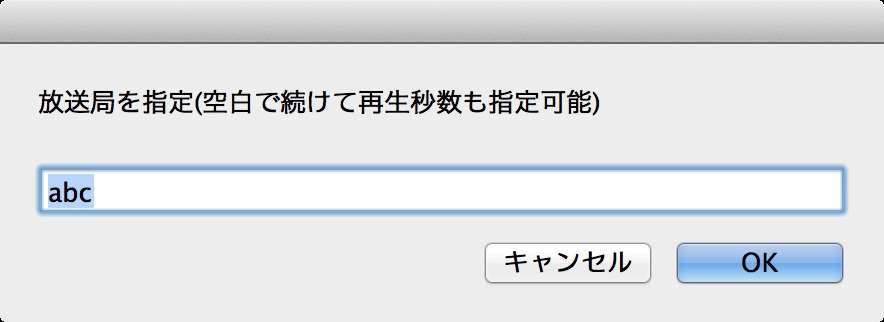Radikoでいちいちブラウザ開くのも面倒
Radikoでブラウザ開くのは面倒ですね。まぁRadikoは広告費運営されてるから、サイト非表示で再生するのはRadikoそのものもを圧迫するかもしれないんだけど。iphoneとかで再生するのも面倒だしね。
ターミナルで再生するのも面倒だしね。。
ターミナルを普段使わないなら、ターミナルでコマンド叩いて再生するのもいんだけど、ターミナルをメインで使ってる時は、Radikoをうっかり閉じちゃうとか、プログラム切り替えで出てくるので面倒だしね。。
Automatorでコマンド実行することにした。
Automatorで、アプリ作成して、次のように設定した。
- ダイアログボックスでチャンル選んで
- コマンドに引数渡し
- コマンドを実行する
出来上がったapp がこれ
これを実行すると
引数を入れて、OK
再生中は右上に出てくる。再生停止も
再生中は、右上に実行中アイコンが出てくる。ここで閉じるボタンを押すと、再生が停止できる。
チャンネル変更は出来ないw。まぁ阪神戦の中継を流しっぱなしにするぐらいが一番用と大きいのでコレでいいかな。
radikoの再生プログラムはこれ。
This file contains bidirectional Unicode text that may be interpreted or compiled differently than what appears below. To review, open the file in an editor that reveals hidden Unicode characters.
Learn more about bidirectional Unicode characters
| #!/usr/bin/env python | |
| # coding: utf-8 | |
| import pprint | |
| pp = pprint.PrettyPrinter(indent=4) | |
| pprint = pp.pprint | |
| import os | |
| import datetime | |
| import sys | |
| import urllib | |
| import urllib2 | |
| import subprocess | |
| import base64 | |
| LANG = "ja_JP.utf8" | |
| pid = os.getpid() | |
| date = datetime.datetime.strftime(datetime.datetime.now(),'%Y-%m-%d-%H_%M') | |
| playerurl="http://radiko.jp/player/swf/player_3.0.0.01.swf" | |
| playerfile="/tmp/player.%s.swf" % date | |
| keyfile="/tmp/authkey.%s.png" % date | |
| outdir="." | |
| if len(sys.argv) < 2 : | |
| print "Usage :" | |
| print " %s channel_name duration(minuites) [outputdir] [prefix]" % sys.argv[0] | |
| exit() | |
| channel = sys.argv[1].upper() | |
| DURATION = 60*60*3 # 3 時間 | |
| if len(sys.argv) > 2 : | |
| DURATION = int(sys.argv[2]) * 60 | |
| if len(sys.argv) > 3 : | |
| outdir=sys.argv[3] | |
| PREFIX=channel | |
| if len(sys.argv) > 4 : | |
| PREFIX=sys.argv[4] | |
| # | |
| # get player | |
| # | |
| if os.path.exists( playerfile ) == False : | |
| try : | |
| body = urllib2.urlopen( playerurl ).read() | |
| f = open( playerfile, "w" ) | |
| f.write(body) | |
| f.close() | |
| except URLError, e: | |
| print e | |
| exit() | |
| # | |
| # get keydata (need swftool) | |
| # | |
| if os.path.exists( keyfile ) == False : | |
| cmd = "/usr/local/bin/swfextract -b 14 %s -o %s" % (playerfile, keyfile ) | |
| subprocess.call( cmd.strip().split(" ") ) | |
| if os.path.exists( keyfile ) == False : | |
| print "failed get keydata" | |
| exit(1) | |
| # if [ -f auth1_fms_${pid} ]; then | |
| # rm -f auth1_fms_${pid} | |
| # fi | |
| if os.path.exists( "auth1_fms_%s"%pid ) : | |
| os.remove("auth1_fms_%s"%pid) | |
| # | |
| # access auth1_fms | |
| # | |
| auth_response = {} | |
| url = "https://radiko.jp/v2/api/auth1_fms" | |
| headers = { | |
| "pragma":"no-cache", | |
| "X-Radiko-App":"pc_1", | |
| "X-Radiko-App-Version":"2.0.1", | |
| "X-Radiko-User":"test-stream", | |
| "X-Radiko-Device":"pc" | |
| } | |
| values = { "\r\n": "" } | |
| data = urllib.urlencode(values) | |
| try : | |
| req = urllib2.Request(url, "\r\n" ,headers ) | |
| res = urllib2.urlopen(req) | |
| auth_response["body"] = res.read() | |
| auth_response["headers"] = res.info().dict | |
| #f = open( "auth1_fms_%s"%pid , "w" ) | |
| #f.write(body) | |
| except : | |
| print "failed auth1 process" | |
| exit() | |
| # | |
| # get partial key | |
| # | |
| authtoken = auth_response["headers"]["x-radiko-authtoken"] | |
| offset = auth_response["headers"]["x-radiko-keyoffset"] | |
| length = auth_response["headers"]["x-radiko-keylength"] | |
| offset = int(offset) | |
| length = int(length) | |
| f = open(keyfile, 'rb+') | |
| f.seek(offset) | |
| data = f.read(length) | |
| partialkey = base64.b64encode(data) | |
| print "authtoken: %s \noffset: %s length: %s \npartialkey: %s" % (authtoken,offset,length,partialkey) | |
| #partialkey=`dd if=$keyfile bs=1 skip=${offset} count=${length} 2> /dev/null | base64` | |
| # | |
| # access auth2_fms | |
| # | |
| auth_success_response ={} | |
| url = "https://radiko.jp/v2/api/auth2_fms" | |
| headers ={ | |
| "pragma":"no-cache", | |
| "X-Radiko-App":"pc_1", | |
| "X-Radiko-App-Version":"2.0.1", | |
| "X-Radiko-User":"test-stream", | |
| "X-Radiko-Device":"pc", | |
| "X-Radiko-Authtoken":authtoken, | |
| "X-Radiko-Partialkey":partialkey , | |
| } | |
| try : | |
| req = urllib2.Request(url, "\r\n" ,headers ) | |
| res = urllib2.urlopen(req) | |
| #print res.read() | |
| auth_success_response["body"] = res.read() | |
| auth_success_response["headers"] = res.info().dict | |
| except URLError, e: | |
| print e | |
| exit() | |
| print "--------------------------" | |
| print "authentication success" | |
| area = auth_success_response["body"].strip().split(",") | |
| areaid = area[0] | |
| print "--------------------------" | |
| print "areaid :%s" % areaid | |
| print "channel program list url http://radiko.jp/v2/api/program/today?area_id=%s" % areaid | |
| print "--------------------------" | |
| print "list of channels " | |
| channels = subprocess.check_output( "curl -s http://radiko.jp/v2/api/program/today?area_id=%s " % areaid+ | |
| "| xmllint --format --xpath //station/@id - "+ | |
| " | ruby -ne 'puts $_.split ' " , | |
| shell=True) | |
| print channels | |
| print "--------------------------" | |
| print " your choice : %s " % channel | |
| if not channel in channels : | |
| print "station %s is not available. " % channel | |
| exit(1) | |
| # | |
| # get stream-url | |
| # | |
| if os.path.exists( "%s.xml" % channel ) : | |
| os.remove("%s.xml" % channel) | |
| try : | |
| channel_url = "http://radiko.jp/v2/station/stream/%s.xml" % channel | |
| body = urllib2.urlopen( channel_url ).read() | |
| f = open("%s.xml" % channel, "w") | |
| f.write( body ) | |
| f.close() | |
| except : | |
| print "error in to get %s.xml " % channel | |
| cmd = "xmllint %s.xml --xpath /url/item[1]/text() " % channel | |
| stream_url = subprocess.check_output(cmd.strip().split(" ")) | |
| print stream_url | |
| cmd = "echo '%s' | perl -pe 's!^(.*)://(.*?)/(.*)/(.*?)$/!$1://$2 $3 $4!'" % stream_url | |
| print cmd | |
| ret = subprocess.check_output(cmd, shell=True) | |
| url_parts = ret.split(" ") | |
| os.remove("%s.xml" % channel) | |
| play_cmd = '/usr/local/bin/rtmpdump -v \ | |
| -r %s \ | |
| --app %s\ | |
| --playpath %s \ | |
| -W %s \ | |
| -C S:"" -C S:"" -C S:"" -C S:%s \ | |
| --live \ | |
| --stop %s ' % (url_parts[0],url_parts[1],url_parts[2], playerurl,authtoken,DURATION) | |
| print play_cmd | |
| print " " * 10 | |
| print "\n" | |
| p1 = subprocess.Popen(play_cmd.strip().split(" "), stdout=subprocess.PIPE) | |
| p2 = subprocess.Popen(["/usr/local/bin/mplayer", "-"], stdin=p1.stdout) | |
| p1.stdout.close() | |
| output = p2.communicate()[0] | |



